#Volkh Vseslav
Explore tagged Tumblr posts
Text
Gamma C characters Edition






#housamo#tokyo afterschool summoners#another eidos of dragon vein#Horkeu Kamui#Volkh Vseslav#Hombre Tigre#Tsathoggua#Bonvoy#Billford#Sorry i couldn't do crave cause they dont have a lot of sprites#And Tsathoggua gets a belly rub cause of his Summer SQ#Sadly Marion doesn't have the Chest nor the Fluff to be here sorry#Meme
55 notes
·
View notes
Text

Should one single child have to step up into the role of a hero meant to fall? Why not give every child the opportunity to rise for the occasion! Such is the ideology of the Werewolf Czar, Volkh Vseslav.
11 notes
·
View notes
Text


Wolf Transients
#illustration#anthro#anthropomorphic#housamo#放サモ#tokyo afterschool summoners#housamo horkeu kamui#housamo volkh vseslav#housamo fenrir#housamo hati#housamo temujin#housamo snegurochka#housamo breke#housamo bathym#my art
80 notes
·
View notes
Text

Little Red Riding Hood
Mc2 as Little Red Riding Hood
Volkh Vseslav as he big bad wolf
13 notes
·
View notes
Text
Melty Dream with Volkh Vseslav - Tokyo Afterschool Summoners
via IFTTT
youtube
View On WordPress
0 notes
Text
It's funny how Volkh Vseslav was released more than 3 years ago, and still the only thing I know about him is that his name is Volkh Vseslav.
And that he's a good kisser

55 notes
·
View notes
Text

Bumper sticker for yall
23 notes
·
View notes
Text
“El Cantar de las huestes de Ígor”: EL EPISTROFO RUSA Y LA FILOSOFÍA DEL BARDO

Dmitry Kozhemyakin
Traducción de Juan Gabriel Caro Rivera
Informe del seminario "La Rusia ideal, normal, infernal"
"El cantar de las huestes de Igor, de Igor, hijo de Svyatoslavov, nieto de Oleg" es un monumento único de la literatura rusa antigua, escrita en el siglo XII, solo unas pocas generaciones después del bautismo de Rusia. Según la mayoría de los investigadores, el desconocido autor puede considerarse como un miembro del séquito aristocrático.
El texto fue descubierto por el conde Alexei Musin-Pushkin a fines de la década de 1870, pero se encuentran referencias al Cantar en varias obras escritas en los libros rusos antiguos, por ejemplo, en la Zadonshchina. Las imágenes del Cantar tienen paralelos obvios con las epopeyas populares, con sus personajes, por ejemplo, el libro Vseslav Polotsky y la épica Volkh Vseslavich. A fines del siglo XIX, cuando el Cantar se hizo conocido para el público general, tuvo un tremendo impacto en la cultura secular. Muchos artistas dedicaron obras a este texto. Escribieron poesía, compusieron música, representaciones teatrales y mucho más. Una muestra de su influencia es notable en la cultura moderna, por lo que el estudio del Cantar es tan significativo.
La singularidad del Cantar consiste, en primer lugar, en dos aspectos. El primer aspecto es el carácter no eclesiástico de la obra, pero el segundo, posiblemente derivado del primero, es la abundancia de imágenes y símbolos paganos. Ante nosotros hay una síntesis peculiar de elementos paganos y cristianos, que es un ejemplo de una tradición cultural militar, turaniana y androcrática.
La misma comunidad cultural que se esparció por la Gran Estepa por medio de las migraciones de las tribus indoeuropeas y, que se mezcló con los pueblos sedentarios que rodeaban la Estepa, lo cual creó las grandes civilizaciones del mundo antiguo: los hindúes, los iraníes, la helénica. Sus huellas se pueden ver, por tanto, en el Cantar, en aquellos ideales por los cuales luchan los príncipes, como la gloria del pasado, que cantan el profético Boyan y el autor anónimo. A este respecto, es posible considerar en la obra una serie de símbolos y correlacionarlos con otros símbolos del mismo Logos apolíneo, en particular con el platonismo griego.
Vale la pena comenzar con el profético Bardo. En el Cantar, este es un personaje especial. Es el "cantante de los viejos tiempos", capaz de viajar hacia lo alto asociado con imágenes del cielo, del árbol. Existe la tradición de considerar al Bardo como un representante de la tercera función, del pueblo, del campesinado, sobre la referencia de una indicación de su parentesco con Veles, huellas de una devoción que encontramos entre el campesinado eslavo.
Sin embargo, para una cosmovisión estrictamente apolínea, la imagen de Veles podría interpretarse, no equipararse con el dios de las bendiciones ctónicas. En este caso, el Bardo puede ser considerado como un representante de la primera función, del sacerdocio, y también puede ser percibido como un prototipo del filósofo platónico que asciende verticalmente para ver y transmitir la guerra en su más alta dimensión ideológica. Él también, al elevarse, da a conocer a los príncipes la Gloria.
La gloria en el texto es un concepto especial. Está relacionado principalmente con la dignidad principesca, ya que en la guerra son los príncipes quienes obtienen la gloria, los guerreros soldados solo reciben el honor.
El segundo paralelo importante entre el Cantar y el platonismo se puede ver en el paradigma de la lucha. En la contienda, el autor ve el descenso de Rusia de lo Uno a los Muchos, de la "Rusia Troyana" a la "Rus de los agravios". La Rusia Troyana puede entenderse como un arquetipo de Rusia, como su proximidad a su fuente solar celestial. Los príncipes de esta Rusia son mucho más consistentes con el paradigma ideal del príncipe. Están unidos, llenos de voluntad, viven por la adquisición de la Gloria, del Ser-para-la-Muerte.
Además, todo el atractivo del trabajo está relacionado con la necesidad de regresar, con Epístrofo, después de pasar el último límite de la dispersión, encarnado en el fracaso de la campaña de Igor, es necesario regresar allí, a los Tiempos Troyanos.
La diferencia entre Vladimir el Bautizado en el texto del Cantar y su contraparte épica también es significativa. Aquí no es un "motor inmóvil" de Rusia, pasando su tiempo en fiestas y banquetes, sino un poderoso señor que las montañas no pueden contener. A lo largo de la obra, uno puede ver cuán pocos pensamientos principescos son dedicados a lo que generalmente consideramos una parte importante de la actividad estatal. No guarda ni distribuye bienes, no defiende su patria, sino que emprende guerras, pasa sus vidas en campañas para hacer que su nombre sea inmortal por los siglos. Esta es la diferencia entre el Logos del Estado autónomo y el Logos de las personas. El Estado del Cantar es un Estado celestial de guerreros, principalmente pensando en la Eternidad, en segundo lugar en el honor y en los intereses económicos y egoístas no se piensa en absoluto.
8 notes
·
View notes
Photo

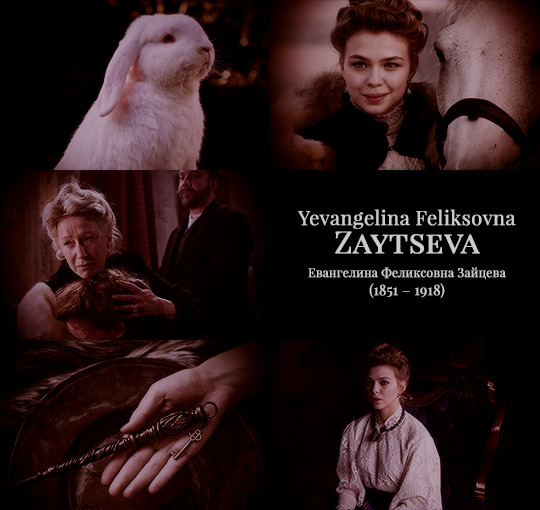
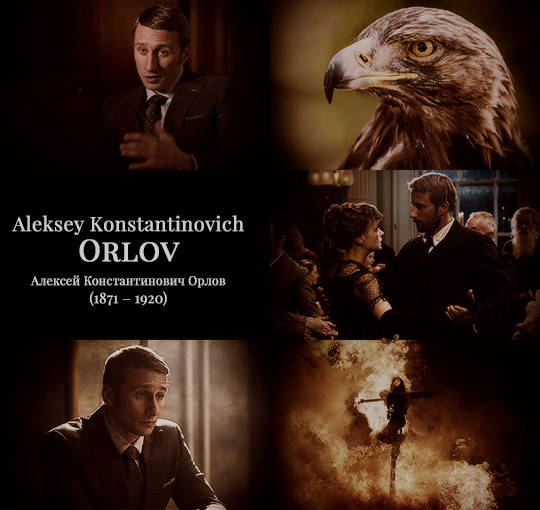
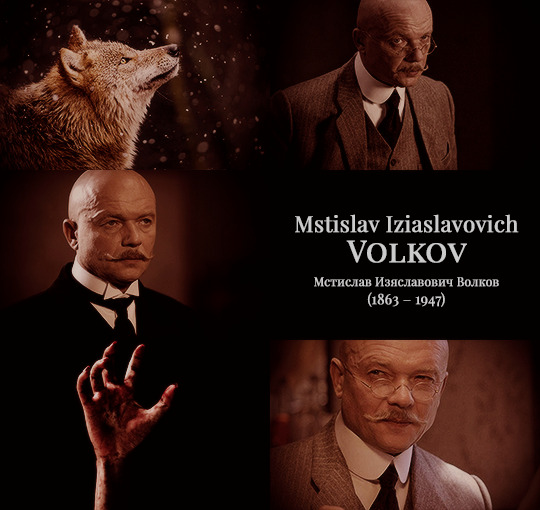

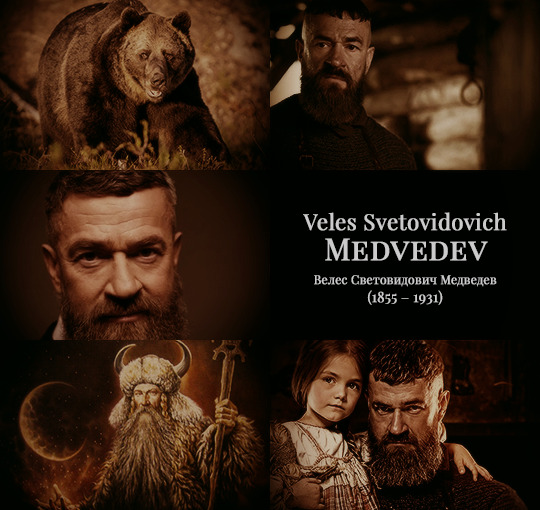

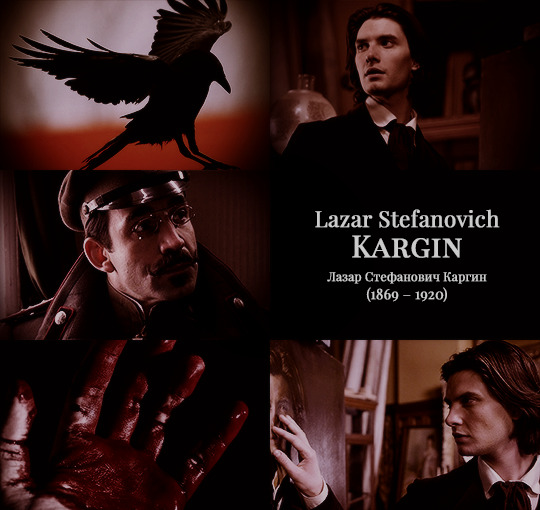

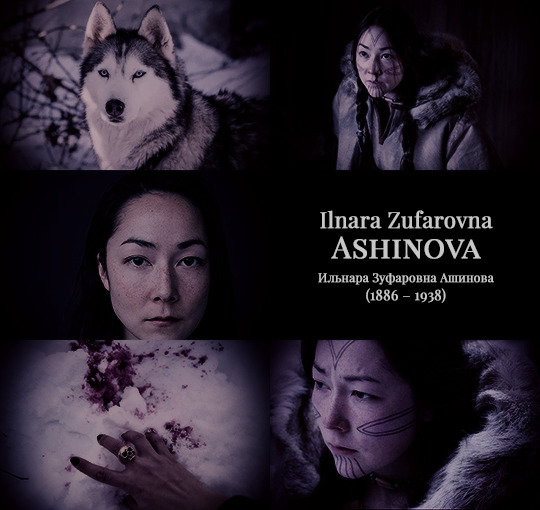
Wizarding Russian Empire and USSR || VSDP or “ Vernyye synov’ya i docheri Peruna”
Yermak Afanasiyevich Tigrov (20 April 1864 – 1 May 1918) Born in Siberia as the son of an Auror, Tigrov was of mixed Russian and Tatar descent. He completed his studies at Koldovstortez in 1882 and became an Auror in 1884. Afterwards, he traveled extensively in the East, spending time in Afghanistan, China, Iran, Mongolia, and Turkey. In 1916, he was recalled to Russia to try and keep the peace, but was unenthusiastic about doing so. Like many others in the Russian Empire, he opposed the Volshebny Duma’s policy of non-interference by witches and wizards in World War I and openly commented to some of his fellow Aurors that if wizards and witches joined in, the war would be over in a matter of weeks.
In 1917, he was stationed in Ledenets when the Volshebny Duma resigned and became attached to the provisional Ministry that was established afterwards and announced that Ledenets would now be its new capital. In the summer, Olimpiya Feodorovna Zmeyeva convinced the Minister, Aleksey Varfolomeyevich Protopopov, to appoint him as the head of the Auror Office. That July, Tigrov helped put down a rebellion in Ledenets and ordered the arrests of numerous members of the BK, of which only Nikolai Savvich Babushkin and Zaria Kresnikovna Krasavkina managed to avoid by fleeing across the Black Sea to Romania. He proposed executing all of the members of the BK they did arrest on the spot, but Protopopov refused.
Tigrov and Protopopov continued to clash until the fall of 1917 when he was arrested and accused of plotting a coup. This was ill-received by most of the Aurors and other members of magical enforcement, who saw it as a frame-up job. This meant that most of them fled Ledenets and Lysaya Gora and the few that stayed did nothing when the BK launched a successful coup that November.
Afterwards, he and his followers escaped from prison and fled to the Volga region, where the Auror, Yevangelina Zaytseva, was stationed. Almost immediately upon their arrival, Tigrov and his followers began a reign of terror, slaughtering anyone got in their way. However, his time in the field proved short-lived and he died in battle in May 1918.
Yevangelina Feliksovna Zaytseva (5 November 1851 – 19 November 1918) Zaytseva was born in what is now the Yaroslavl Oblast. Her father was an Auror, but had been born a rozhdennyy zemley from a peasant family. She completed her schooling at Koldovstortez in 1869 and became an Auror herself in 1874. Despite this, she had the reputation of being a deeply religious woman who was also rather shy and soft-spoken.
In 1880, she married Pyotr Markovich Belyakov, by whom she had two sons and a daughter. From 1906, however, Zaytseva became suffering from increasingly ill health and spent much of her time in the Crimea. She went into semi-active duty again after the outbreak of World War I, mostly to round up witches and wizards found to be aiding their muggle countrymen, something she secretly found distasteful.
However, by January 1916, she sent an owl to the Volshebny Duma’s officials in Lysaya Gora telling them the situation was so unstable they needed to appoint a Velikiy Volkh or Velikaya Vel’va immediately to avert the looming crisis. They settled on Boris Arkadyevich Nureyev, but he resigned on 24 February 1917 and declared that the Volshebny Duma had completely failed, should be abolished, and fled the country.
While ostensibly loyal to the new provisional Ministry, Zaytseva disliked and distrusted many of its newest members and thought everything would be better if the Aurors were running the show. When Protopopov asked her to replace Tigrov as the Head of the Auror office after his arrest, she refused, giving the excuse of ill health (which was actually true; she had caught a case of Black Cat Flu in February 1917 that she couldn’t shake).
After the overthrow of the Ministry by the BK, Zaytseva welcomed Tigrov and his followers after they were broken out of prison, even though she had serious doubts about his level of intelligence. After his death, she led what was left of his followers until she also died of Black Cat Flu and exhaustion in November.
Aleksey Konstantinovich Orlov (9 March 1871 – 15 March 1920) Orlov was born in Lysaya Gora into an Old Pureblood family that claimed descent from 15th-16th century medieval Pontic Greek scholar and wizard, Basilios Aetós of Trebizond. Like his father, he became an Auror in 1893 and afterwards, spent most of his time hunting pursuing witches and wizards who, as a result of the 19th century fad for occultism in Russia, had taken to scamming zemylane out of their money and threatening the Statute of Secrecy by doing so. In 1904, he accompanied an expedition into Tibet that was aimed to capture a live yeti for study.
Once World War I broke out, Orlov went along with the Volshebny Duma’s line of strict non-interference, though was rather ambivalent about doing so. After the dissolving of the VD in 1917, he traveled to Ledenets in March and strongly advocated for a strong line to maintain order, but was overruled. After the collapse of the provisional ministry, he fled to Siberia and set up operations there.
He and Yelisaveta Korsakova are usually considered the least horrible members of the VSDP, as they lacked their compatriots’ overt prejudices against rozhdennyy zemley, non-humans, and halfbreeds, and took no joy in wanton slaughter, yet neither were politicians. Though they’d never met and were on opposite sides of the war, he had a rather similar personality to his first cousin, Ustinya Feodorovna Orlova: both were shy and prone to melancholy and preferred to be followers rather than leaders.
In March 1920, he was captured by a group of irate goblins, who blamed him for the endless persecution they had been receiving from members of the VSDP. They snapped his wand in half and forced him to watch his followers being burned alive before they cut off his head, burned the body, and sent the head to Mstislav Volkov, along with a warning.
Mstislav Iziaslavovich Volkov (20 December 1868 – 6 January 1947) Volkov was born into a poor Halfblood family from Saratov, and his mother, Gertruda Madejówna, was a Polish zemylanin. He was, in fact, a first cousin of Miroslava Vseslavevna Volkova, but her father, Vseslav Svyatoslavovich Volkov, had been disowned by his family after he was infected with lycanthropy at the age of 13. Volkov was raised as a devout Russian Orthodox Christian and completed his studies at Koldovstortez in 1887. He afterwards tried and failed twice to qualify as an Auror before finally succeeding in 1898.
In 1917, he was stationed in the Ukraine and agreed to pledge allegiance to the Ministry that had been formed to replace the Volshebny Duma. However, he was not against the idea of the Aurors running the country and completely lost faith in the Ministry and Aleksey Protopopov after he ordered the arrest and dismissal of Tigrov. He was also arrested shortly after Tigrov, but was broken out of prison after the BK overthrew the Ministry. Like Orlov, Volkov was not a politician and had little idea of politics in general, but was aware that restoring the VD was not an option on the table. Regardless, he repeatedly clashed with Yelisaveta Korsakova and Leonid Arslanov; they disagreed on allies and tactics, and were of different classes.
While Medvedev was headed to attack Ledenets in 1919, he led a force to take over Lysaya Gora, but was repelled and forced to retreat after being attacked in the Ukraine by a combination of the forces of Svjatoslav Volodymyrovych Tkachenko and Perun Ilyich Hromovych. On their way back to Southern Russia, his forces took bloody revenge against the population of the Ukraine, particularly non-humans, who they viewed as collaborators of the BK (ironically, some of the BK believed non-humans were pro-VSDP). Volkov then had a rather understandable breakdown after goblins sent him the head of Aleksey Orlov in a box in the spring of 1920, along with a note warning them that he would be next, and agreed to recall Korsakova, who would gone into exile with her mother and daughters.
Despite being unpopular in exile circles, the Zhnetsy made several attempts on his life: including several assassination attempts; trying to lure him back, as they had done to Olimpiya Zmeyeva; and two failed kidnappings. He died in January 1947 in Canada and expressed regret before his death that he could not be buried in Russian soil.
Leonid Vasilyevich Arslanov (9 August 1863 – 11 January 1946) Arslanov was born in Lysaya Gora into a family of Aurors, the eldest of five brothers. He secretly participated in World War I, but his activities were discovered by the Volshebny Duma, who had him arrested and thrown into prison in 1915. He was released in 1917 and became an outspoken supporter of Yermak Afanasiyevich Tigrov and fled from Ledenets after Protopopov ordered Tigrov’s arrest. In the fall of that year, he helped break Tigrov out of prison and they fled toward the Don region after.
After the deaths of Tigrov and Zaytseva, he suggested that they should ally with the Austrian and German ministries (as well as their muggle governments) against the BK and Bolsheviks, but his suggestion was rejected as lunacy by Mstislav Volkov, who blamed the Austrians and Germans for the devastation of Russia. In the spring of 1919, Arslanov resigned and emigrated to Vienna and then the south of France. In exile, he was one of the targets of the mid-1920s operation by the Zhnetsy to lure ex-members of the VSDP back to the USSR, but dragged his feet about going back and instead sent minions, who met varying fates.
By the mid-1920s, Arslanov had become an open admirer of Gellert Grindelwald and agreed with his plans for wizards and witches to rule over muggles and non-humans. Like many members of the OSK, he openly worked with Grindelwald’s forces during the Global Wizarding War, but was captured in 1944 by the Allies. He afterwards handed over to the Zhnetsy, and was repeatedly tortured by Andronik Nikiforovich Orlov and Svarog Borisovich Myasnikov. After a token show trial, he was executed on 6 January 1946.
Veles Svetovidovich Medvedev (14 May 1855 – 9 May 1931) Medvedev was born in what's now the Novosibirsk Oblast as the son of Pureblood peasants, Svetovid Yarovitovich Medvedev and Zemlya Volosovna Dubovich. He was the eldest of twelve children, though only nine survived childhood. He completed his studies at Koldovstortez in 1872 and became an Auror in 1878. During World War I, he was stationed in the Caucasus with Feodosiy Valentinovich von Bärwald and repeatedly clashed with him. Bärwald thought his Old Pureblood background made him more deserving of command and wanted to take part in the war even though the VD had banned interference.
After 1917, he was a noted supporter of Tigrov and was dismissed for it. In response, he traveled to Ledenets and participated in Tigrov’s possible coup, but escaped arrest afterwards by fleeing to the Ukraine and then Romania. In 1918, he got in touch with Orlov and Volkov and purposed that he coordinate an attacks on Ledenets from several fronts (one from Romania, one from the Ukraine, and one from the Crimea) but this would take time to do because the isle of Buyan could only be reached by ship.
The BK caught wind of his plan and sent Mikhail Anatolyevich Reznichenko to defend the isle, but Reznichenko instead spent his time relaxing in the southern Ukraine. Thing seemed promising when Medvedev landed on Buyan in October, but things quickly went wrong when the other planned forces from the Ukraine and Crimea never arrived. On top of that, Oksana Iosifovna Lutsenko had personally come to Ledenets and urged on the defense of the city. Medvedev tried to flee across the Black Sea, but was caught before he could do so and imprisoned. He might have been executed, but the British and French ministries intervened and managed to save his life. Afterwards, Medvedev went to live in exile in Norway and died there in 1931.
Yelizaveta Patrikeyevna Korsakova (27 May 1873 – 30 April 1929) Korsakova was born in in the Novgorod region to an Old Pureblood family of mixed Lithuanian, Russian, and Tatar descent. She was the eldest of her parents’ four children and the only daughter, and was very close throughout her life to her father, Patrikey Aleksandrovich Korsakov, a musician and scholar.
She completed her studies at Koldovstortez in 1890 and, afterwards began training to qualify as an Auror, doing so in 1894. Shortly after, while in Ledenets, she re-met her former classmates, Lazar Stefanovich Kargin and they married the following year.
While World War I raged, they were stationed together in the Rostov region, and outwardly remained loyal to the Volshebny Duma, though had serious doubts about how viable the VD’s policy of non-interference was in the wake of such destruction and unrest. In March 1917, they both resigned and went back to the Crimea, where Kargin had been born, after sending their daughters to live with Korsakova’s mother, Artemisia Timofeyevna Kotova, in Ledenets. (They would later be smuggled out of the city in the summer of 1918 by Olimpiya Zmeyeva, and went to live in Serbia.)
During the Civil War, she repeatedly clashed with her constantly clashed Mstislav Volkov, and constantly criticized his decisions, while Kargin tried to play the peacemaker, though not always successfully. One thing she did manage, though, was to convince him to send the Zhnetsy after the former Storozhey agent provocateur, Despina Stefanovna Golubeva, when she wrote to them in February 1919 begging for rescue. In response to her criticisms of his command, Volkov dismissed her and she went into exile in the Balkans, where her mother and four daughters had sent in 1918.
After Volkov’s resignation, she agreed to lead what was left of the VSDP and attempted to create reforms and build links with Georgia and the Ukraine and the forces of some of the KDMM, Shabash Volshebnikov, and OSK. However, by that point, it was far too late. She suffered a further blow when she received word that her husband had died in BK captivity in unclear circumstances.
After Kargin’s death, she became known as “the White Widow”, by both the VSDP and BK, though naturally the presentation differed, with the former's propaganda treating her as a genteel, heartbroken lady and the latter’s as vengeance-crazed and bloodthirsty. By the end of 1921, Korsakova fled back to the Crimea and went into exile, urging what was left of her supporters to follow her. Those who choose not to were later exterminated by a committee headed by Ileana Voinea, Zlata Zoranovna Voloshyna, and Vera Sergeyevna Podgornova.
From 1923, she lived in Yugoslavia with her mother and daughters, where she received a warm welcome because of her late husband’s Serbian roots. Perhaps the most prominent of all Russian and Ukrainian emigres and Korsakova lionized as a great heroine by them, while the BK continued to view her as their greatest enemy. Oksana Lutsenko, in her memoirs, suggested that Korsakova was probably the cleverest of the VSDP’s leaders, though undercut the praise by adding afterwards that, “that wasn’t exactly difficult.”
While generally in good health, she fell ill in February 1929 and was dead by the end of April. Her death was a result of an operation undertaken by the new Zhnetsy, Yeva Naumovna Yablochkova and Karta Davidovna Ozolina. Both would be ill-rewarded, though, as they both perished in the Great Harvest in the late 1930s. Afterwards, her four daughters —Milica, Feodora, Yelena, and Despina— adopted the compound surname Korsakova-Kargina to honor both of their parents. Milica and Feodora both moved to the United States in 1932 with their families and became active in charitable activities and published their mother’s memoirs. Yelena and Despina and their respective families both later went to the UK in the fall of 1936.
Lazar Stefanovich Kargin (1 October 1869 – 30 April 1920) Kargin was a Halfblood, born in the Crimea to a zemylanin father and a witch from a Serbian Old Pureblood family, Zorica Komnenović. She named him after the 14th century Serbian prince, Lazar Hrebeljanović, who was slain at the Battle of Kosovo in June 1389. He completed his studies at Koldovstortez in 1887 and qualified to become an Auror in 1890.
He married his former classmate, Yelisaveta Korsakova, in 1895, who purportedly turned down several other proposals, and they had four daughters together between 1896 and 1902. During the Civil War, he attempted to keep the peace between the members of the VSDP (chiefly between his wife, Korsakova and Volkov) but found himself frequently unable to do so.
In 1920, he was captured by followers of Mikhail Anatolyevich Reznichenko, who held him prisoner. There were hopes that he could be used a bargaining chip with his wife, who had returned to Russia that March, but that hope was smashed when he was murdered in at the end of April by Reznichenko’s followers while they were intoxicated. Babushkin was infuriated at Reznichenko’s actions and had him temporarily stripped of command.
After the death of his wife in 1929, all four of their daughters began referring to themselves with the compound surname, Korsakova-Kargina, to honor both of their parents.
Feodosiy Valentinovich von Bärwald (24 December 1880 – 31 October 1921) Bärwald was born in Styria into a Baltic German Old Pureblood family, while his mother was from a Tatar family that had converted to Christianity in the 15th century. His father was committed to an asylum when he was eight and afterwards he was raised principally by his mother, or rather his mother’s old Domovoy. She sent him to Durmstrang instead of Koldovstortez, but he was expelled in 1897 for almost killing another pupil during a fight. Though uninterested in most intellectual pursuits, he was fascinated from a young age with the Mongol khans and Byzantine emperors. He became an Auror in 1900, mostly because of his family connections, but found it difficult to get along with most of his fellows. During World War I, he was stationed in the Caucasus to make sure that the no wizards or witches interfered and met a like-minded soul named Ilnаra Ashinova, a woman of Tatar and Buryats descent, who also shared his contempt for the VD’s ban on participation. After the second Revolution, they both intended to join Tigrov in southern Russia, but they heard that he had died before they could, so they instead made their way to Siberia and volunteered to fight against the BK. Unlike Orlov, however, Bärwald wanted to revive the Volshebny Duma as it had been when it was first founded in the 10th century, an idea that Orlov considered completely insane. Despite this, he was not in a position to turn away volunteers, no matter what their ideas were. While stationed in the Far East, Bärwald apparently lost interest in reviving the Volshebny Duma and instead decided that the Mongol Empire should be revived, but this time, it should be headed by wizards, who could rule over a subjugated population of zemylane and non-humans, as they were destined by God and nature to be under the heel of their betters. This, however, did not work out. After Orlov was killed in the spring of 1920 by irate Goblins, Ashinova and many other members of the VSDP stationed in Siberia decided to flee toward China, but Bärwald refused to give up his dream of a revived Empire, though he did send his pregnant wife, Sarnai, to Manchuria under the care of Ashinova. He was betrayed and captured by the BK in the fall of 1921 and gave him a show trial and executed on 31 October 1921. He had no children by Sarnai, as she apparently miscarried, but he possibly had a few by Ashinova, though she was married to another man at the time. Ilnаra Zufarovna Ashinova (30 April 1886 – 2 November 1938) Ashinova was born in what is now Buryatia in Siberia. Her father was a Siberian Tatar originally from Krasnoyarsk Krai and her mother was a Buryat. She had no formal education and her first languages were Siberian Tatar and Buryat, so always spoke Russian with a thick accent. Despite her lack of education, she first joined the Department of Magical Law Enforcement in 1903. While stationed in the Caucasus during World War I, she first met the Auror, Feodosiy Valentinovich von Bärwald. Bärwald was from an Baltic German Old Pureblood family, but had a lifelong fascination with the Mongols and Tatars and so immediately gravitated toward Ashinova, who didn’t mind at all that he had none of the polished manners that were expected from Aurors during that period. Neither of them were happy about the Volshebny Duma’s order of non-interference and both believed that it was the natural order for wizards to rule over all non-magical people. Yelisaveta Korsakova, who knew them both well, believed that Ashinova was the slightly less violent and unstable of the two, yet she almost worshipped Bärwald as a god and, indeed, proclaimed that he was clearly an incarnation of the Mongol god of war, Daichi Tengri. After Orlov was murdered by Goblins in March 1920, Eastern command was technically transferred to her, but she instead decided to flee to Manchuria by August of the same year. She wrote to Bärwald telling him to join her, but he chose not to listen and was instead captured in the fall of 1921. Regardless, Ashinova reportedly wept bitterly when she heard of his execution in October 1921 (being one of the few to do so) and proclaimed that he would one day return to destroy the BK. Afterwards, she lived in Eastern Asia and had little to do with the majority of the VSDP exiles. In 1925, she infamously gouged out her own eyes and proclaimed that the goddess, Palden Lhamo, had appeared to her in a dream and told her to do it, so that she could become a true seer. Afterwards, she apparently developed the habit of issuing prophecies, of rather dubious authenticity and which few cared to listen to. Though not a threat to anyone anymore, she was assassinated in Macau in 1938 by the order of the Zhnets, Orfna Orfeyevna Olenenko, who had initiated a mass assassination campaign against the wizarding USSR’s foreign enemies. Ashinova married twice in her life and had eight children (four sons and four daughters), and twenty-four grandchildren. Her first husband was a Buryats, Mergen Bayanovich Tsyrenov, who was killed in 1919, while her second, whom she married in 1923, was Chinese. It is likely that all or some of her three youngest children, all of whom were born between 1914 and 1918, were fathered by Bärwald.
7 notes
·
View notes
Photo

‘Mikula Selyaninovich and Volga Svyatoslavich’ by Konstantin Vasiljev.
Mikula Selyaninovich (Russian: Микула Селянинович, Mikula the Villager's Son) is a Russian epic hero (a bogatyr) and a plowman, from the Novgorod Republic bylina cycle. A common plot trope in bylinas involving Mikula is that another bogatyr of warrior type turns out to be weaker than Mikula: cannot pull his plow out of the soil, cannot lift his bag, cannot race him, etc., because Mother Earth loves him.
Volga Svyatoslavich (Russian: Вольга Святославич) or Volkh Vseslavyevich (Russian: Волх Всеславьевич) is a Russian epic hero, a bogatyr, from the Novgorod Republic bylina cycle. He is known as sorcerer - can turn into animals and speaks with them. Some historians think the character is based on Vseslav of Polotsk.
#konstantin vasiljev#Константин Васильев#bylina#russian epic poem#slavic epic poem#bogatyr#volga svyatoslavich#вольга святославич#mikula selyaninovich#Микула Селянинович#былина#богатырь
53 notes
·
View notes
Text

#Masanori#Krampus#Taishakuten#Takeminakata#Hippolytus#Gurl even Sawch sees Volkh part of the main cast proves he should have gotten the alt#Volkh Vseslav
42 notes
·
View notes
Text


Horkeu Kamui the Gentle Parent
Volkh Vseslav the Asian parent




Ok for real why didn't they gave the Alt to Volkh?
Like he's basically part of the main cast
I've heard they change it but for some unknown reason
Idk if it has something to do with LW or Gamma C himself
10 notes
·
View notes
Note
https://www.tumblr.com/kairunatic/743835477700968448/horkeu-kamui-the-gentle-parent-volkh-vseslav-the?source=share
Naah fam, hes a Russian parent!
Also with Gamma c, given how he also works as illustrator for both crave saga and AE, he probably just have no time to help LW design Volkh a new alt.
Well I do know Gamma C has some sort of medical condition cause he was tweeting about his medical bills(Yes I have Gamma C tweets on notifi call me a SIMP all you want)
So that's probably the case, or maybe he's just busy with IRL he rarely does art stuff for AE he's most recent was during Casino Event(And it wasn't even much)
And he haven't made much art for his 2 Crave Character too
7 notes
·
View notes
Note
Don't know if you answered this one before but...
Fuck marry kill: Billford, Horkeu Kamui, Volkh Vseslav
You can kill two! just one lol
I'd fuck and marry Billford
The other two can just Kill themselves lol
6 notes
·
View notes
